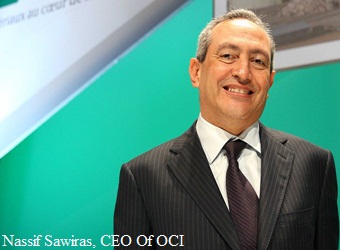OCI N.V.’s subsidiary, Orascom Construction Industries (OCIC.CA), announced on Tuesday that it will pay the Egyptian Tax Authority (ETA) ten instalments during 2013- 2017 totalling EGP 7.1 billion less EGP 182 million in existing tax credits to end a dispute regarding tax claims for the years 2007 to 2010.
During that period, OCI SAE divested its cement business through the sale of a listed subsidiary, Orascom Building Materials Holding (OBMH). The agreed amount is based on the originally disclosed tax claim by the ETA of EGP 4.7 billion including accrued interest and delay fees.
The payments shall start with an initial payment of EGP 2.5 billion in Q2 2013, EGP 900 million in December 2013, six equal instalments of EGP 450 million and two final instalments of EGP 500 million in 2017 totalling the agreed to EGP 7.1 billion.
OCI N.V. will loan its subsidiary OCI S.A.E., the Egypt listed company, the necessary funds required for the tax settlement through intercompany loans to be coordinated and channelled into the country through the Central Bank of Egypt.
The settlement amount was reached following months of challenging negotiations. In conjunction with this agreement, the ETA has determined that there was no tax evasion by the Company and is exonerating management and the Company from any wrongdoing related to the transaction.
With the settlement of the tax claim, OCI N.V. expects to proceed with its filing for the Mandatory Tender Offer (MTO) for the ordinary shares of OCI SAE with details to be announced in due course.
OCI N.V. Chairman Mike Bennett commented, “Having concluded this matter, OCI and its management look forward to a positive relationship with the Egyptian Government where our investments in Egypt can prosper and the Company is able to channel its resources towards growth and potential new investments.”
OCI N.V. Chief Executive Officer Nassef Sawiris commented, “As we end the prolonged period of uncertainty, the Company will now regain its focus on growth initiatives.”
The payment follows an almost year-long dispute with the Egyptian government, in which the Board and management were faced with two choices: 1) enter in to a prolonged legal battle with unpredictable outcomes; or 2) make the payment to the government, despite the unified view by the board, management and auditors KPMG that all laws and regulations were soundly applied and followed at all times. However the Board and management concluded that a prolonged legal process would not be in the best interest of the Company’s stakeholders, including its 45,000 employees in Egypt, who represent 50% of the group’s employee base. In addition, a prolonged legal process would take up a significant part of management’s time and attention, stall our future investment and growth plans, and cause greater uncertainty for our shareholders, creditors and other stakeholders.
